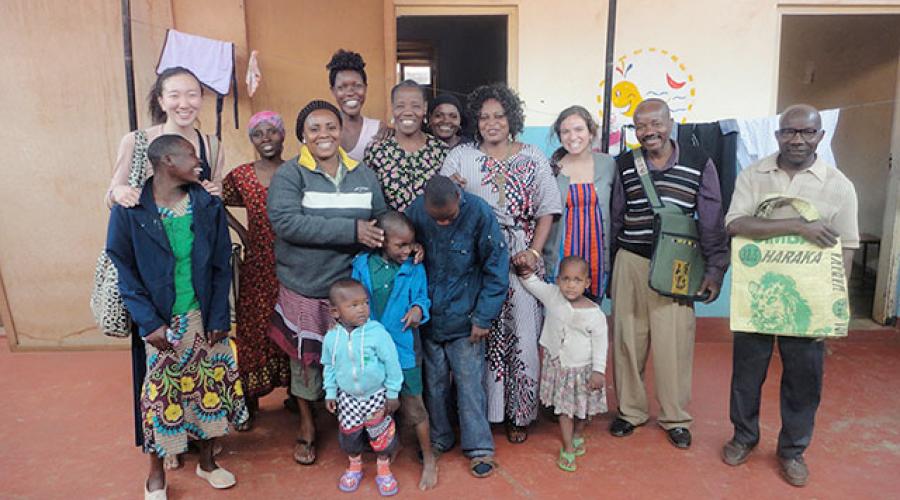
Hannah Kim
From becoming comfortable riding in a minivan with 30 people standing, eating beans and rice cooked by mama, watching a chicken being slaughtered and cooked, seeing herds of zebras and giraffes from only ten feet away, and forming intimate relationships with the people I've met, I can safely say that Moshi, Tanzania, or specifically KCMC Road, feels like my second home.
The first four weeks I spent in Kilimanjaro Christian Medical College (KCMC) developing a policy case study on the abnormal social development of street children in Tanzania. My team consisted of two Tanzanian medical students and one other Cornell student. Working closely with Tanzanian students was such an amazing experience; we were able to compare and exchange our different learning styles in a classroom setting. Together, we interviewed street children centers, psychologists, children living on the streets, and community members to find as much information as we can about the emotional and psychological problems street children encounter. Much time was spent browsing through scientific literature online—not only because of the depth of the content but also because of the slowness of the Internet. I listened to so many stories that moved me, challenged me, and changed the way I viewed the world.
After the four weeks of intensive case study writing, I began my internship at Building a Caring Community (BCC), a non-governmental organization. BCC began with an incredibly confident woman who, after seeing a child with disabilities chained outside of his house, decided to take concrete action to help children with intellectual disabilities by creating this organization. BCC has 11 day-care centers for children with developmental problems. The parents of these children are often impoverished and isolated from the community because of their child's disability. The best part of BCC is that it employs these parents as teachers for the day care centers, provides microcredit loans, and also runs two social businesses that engage the parents. At BCC, I used my knowledge from my ILR courses to assist the social businesses on the issue of sustainability. I researched and interviewed various developmental organizations such as Opportunity International and BRAC in order to help the businesses receive more sustainable loans and grants. I also designed and printed a comprehensive catalog that displayed all the products made by the social businesses. I worked with the parents at the businesses to help them market their products better, especially to tourists. Although my time at BCC was only four weeks, I spent every day with the parents, staff, and the children in BCC. Learning about the different developmental disabilities was inspiring in an indescribable way—the children taught me that patience, laughter, and humility are the three most important characteristics I need to hold onto especially when times are rough.
My favorite part about my life in Tanzania was my homestay family. Living in a house with a mama, baba, dada (sister), and kaka (brother) gave me the best cross-cultural experience I could ever have. I learned to eat, speak, and live like a true Tanzanian. I was incredibly blessed to be a part of a Tanzanian family that were so loving, welcoming, and more than willing to share their culture with me. They say it takes a village to raise a child, and this phrase became a reality to me in Tanzania. As soon as I moved into my homestay, I immediately became a part of the tight-knit community. All the mamas and bebes (grandmothers) in the neighborhood knew me and asked me about myself in their broken English. Dozens of children became my brothers and sisters—they greeted me with the most warmth every time I came back home and danced, sang, and played with me on the porch until it got dark. I was able to quickly adapt to the amazingly rich culture of Tanzania because of my homestay family and the community.
Something Tanzania definitely taught me as a whole is pole pole, or 'slowly slowly.' Taking it slow, to Tanzanians, means stopping on the street to ask a stranger how his day was going, and not rushing the conversation even if it's lasting for an hour. It also means appreciating small things, such as the beautiful (but extremely long) walk from our home to the nearest shop, or the vibrant, unique colors of kitenges (beautiful Tanzanian fabric that African women wrap around as skirts). It means that people appreciate and rely on their neighbors and community, as opposed to turning to the Internet for socialization and stimulation.
Telling my story of all my experiences in Tanzania, the good and the bad, is definitely difficult. My journey is indescribable because it is composed of so many dimensions and feelings. But when I do tell my story, I talk about the charms of Moshi—the warm, welcoming people, the busy streets of Moshi town with crazy yet playful daladala workers, the healthy Chagga food, and my wonderful homestay family. Many of the people I met had such amazing, inspirational, and moving life stories that impacted myself as well. I wish to be as passionate and goal-oriented as the people I have met in Tanzania. I am so thankful of this wonderful experience, and I want to thank the international programs committee for assisting with my funding—thank you for the experience of a lifetime, it was worth every minute.